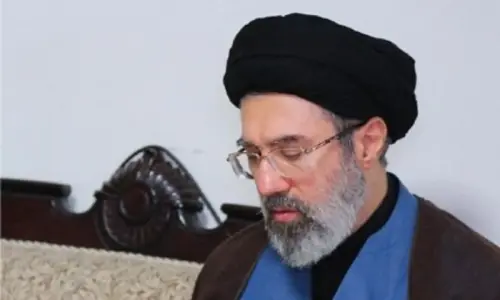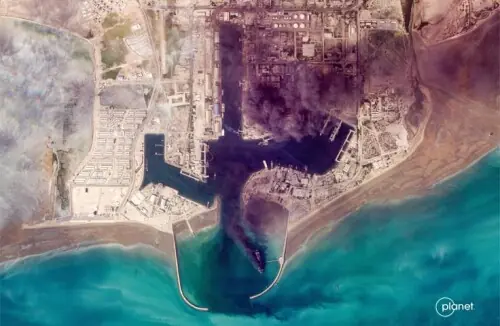ISRAEL’S war on Gaza continues despite rising international concern that the violence can escalate into a wider conflict in the Middle East. Meanwhile, the US role in the crisis has come into sharper focus due to two key developments. One, President Joe Biden’s visit to Israel in the midst of the war. And two, the US veto of a UN Security Council resolution seeking a “humanitarian pause” in the war, which followed its rejection of another resolution calling for a ceasefire.
Biden’s visit took place in the immediate aftermath of the deadly Israeli strike on Al Ahli hospital in Gaza that claimed the lives of almost 500 people. The massacre was condemned across the world and deemed a war crime by international legal experts. A group of independent UN experts said the strikes amounted to collective punishment prohibited by international humanitarian law. Arriving in Tel Aviv when Israel was continuing to bomb Gaza and the UN warned of a looming catastrophe, Biden said he had come to show solidarity and the US would forever stand with Israel. Whether or not some of this was about domestic American politics in election year, his one-sided stance was devoid of any empathy for the suffering of Gaza’s Palestinians or concern about further escalation of the war. Worse, without producing a shred of evidence, he agreed with Israel’s claim that Palestinian militants were responsible for the strike on the hospital.
While anger mounted at the US in the Arab street, Biden’s Middle East diplomacy floundered. Jordan’s King Abdullah and Palestinian President Mahmoud Abbas cancelled their meetings with the American president. Amman was to host a four-way summit with Biden, Egyptian and Palestinian leaders. But this was called off in the wake of the hospital bombing, which King Abdullah described as “a heinous war crime”. Jordan’s foreign minister said the meeting would be held only when the parties agree to end the “war and the massacres against Palestinians”. The diplomatic setback for the US was compounded by the blow to its credibility in the region. The Biden visit came to be widely seen in the Middle East and beyond as giving Israel carte blanche to carry out more bombings and encouraging escalation rather than defusing the crisis.
The longer Israel’s war on Gaza continues, the higher the risk of a wider conflict.
Israel has since intensified its bombing campaign in Gaza and carried out multiple raids into the West Bank which erupted in protests against Israel. It also carried out air strikes on residential buildings, churches and a refugee camp in Gaza. The Biden administration seemed oblivious to the destabilising repercussions of its policy. It failed to see the hospital bombing had become a turning point in the crisis and miscalculated the international response to Israel’s actions, including growing calls for a ceasefire and cessation of hostilities — from governments and people. Washington also discounted the consequences of ‘guilt by association’ with Israel’s military operations because of its blanket support for Tel Aviv.
US conduct in two UN Security Council meetings further reinforced the growing impression around the world that Washington was doing nothing to de-escalate the explosive situation. First it opposed a Russian resolution calling for a ceasefire, saying this did not name Hamas. The resolution failed to secure enough votes to pass. Another resolution, moved by Brazil, calling for a “humanitarian pause” in the war to allow delivery of lifesaving aid to Gaza and also condemning Hamas, received an overwhelming majority of votes — 12 of 15. But the US envoy vetoed the resolution on the grounds that it did not recognise Israel’s right to self-defence. Washington’s refusal to call for a ceasefire or urge restraint on Israel was seen across countries as an endorsement of Tel Aviv’s military actions. This was reinforced by Biden’s move to ask Congress for billions of dollars in “unprecedented” military aid for Israel.
Not surprisingly, the catastrophic situation in Gaza and images of death and devastation following the hospital bombing intensified anti-Israel and anti-US protests as public fury erupted across the world. There was an unprecedented surge in popular solidarity with the Palestinians. This was unsurprising in Muslim countries even if large rallies exceeded those in the past. But many cities in the West also saw big pro-Palestine demonstrations. This wave of global public support for the Palestinians offered a sharp contrast to the position adopted by Western governments.
It is uncertain how the war in Gaza will play out. The key question is what will happen once Israel goes ahead with a ground offensive in Gaza especially as its leaders are also promising a long war. The longer the conflict continues the greater the risk of it spilling over several fronts. The UN envoy for the Middle East told the Security Council last week that “the risk of an expansion of this conflict is very real and extremely dangerous”.
Israel has bombed Syria’s two main airports. There has been an exchange of fire across the Lebanese border. Atrocities against Gaza’s civilians are mounting pressure on Hezbollah in Lebanon to join the conflict. An Israeli ground invasion of Gaza might force Hezbollah to get involved. Should that happen, it would draw in others and likely result in US intervention. Washington has already sent weapons to Israel and deployed two aircraft carrier strike groups in the eastern Mediterranean ostensibly to ‘deter’ Hezbollah and its ally Iran from entering the conflict. American bases in Iraq and Syria have come under drone attack, for which a militant group claimed responsibility citing US support for Israel. A US warship intercepted missiles apparently launched from Yemen. For its part, Iran has warned of “pre-emptive action” to deter Israel’s ground invasion into Gaza.
Arab countries have called for an end to the war and denounced Israeli actions. But pressure is mounting on them from enraged publics to go beyond statements. While no one wants a regional conflagration, so long as Israel continues on an escalatory course that risk will heighten because that would reshape the responses of neighbouring countries. The only way to avert this is an immediate ceasefire and de-escalation. For that to happen the US would have to shift course and prioritise regional peace and justice over blind support for Israel.
The writer is a former ambassador to the US, UK and UN.
Published in Dawn, October 23th, 2023





























